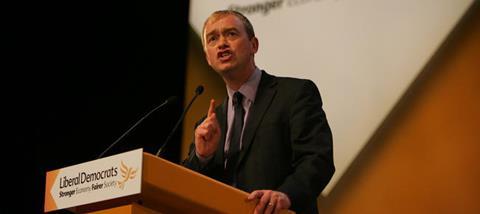
Tim Farron, the leader of the Liberal Democrats, has spoken out about his frustration that UK society still views people with faith with suspicion. In an interview in the Evening Standard, Farron said, "In America you've got to invent a faith to be taken seriously; in the UK you have to pretend not to have one. You shouldn't be ashamed."
Farron is absolutely spot on and especially so when it comes to Christianity. Society is not only suspicious, but certain sectors are increasingly hostile to Christianity. Recent polling suggests this is linked to an increased reticence in the workplace for people to talk about their faith.
Polling by ComRes showed that while 92 per cent of HR managers thought people in their organisations could talk openly about their faith, among workers, only 26 per cent said that people in their workplace talked about their religious beliefs or traditions. 35 per cent said people in their workplace never talk about it. While only three per cent of HR managers and two per cent of workers said they were actively discouraged from discussing their faith, the truth is the pressure on Christians is far more subtle than a memo from the CEO ordering all staff to keep silent about their faith.
Farron has been on the receiving end of this suspicion and hostility. When he became leader of the Lib Dems, the manner in which the media treated him was in the main, utterly contemptible. Remember how John Humphreys mockingly asked Farron if he prayed for divine guidance before making decisions? Behind it all seemed to be the presupposition that Farron’s Christian faith automatically disqualified him from being the leader of the Lib Dems. His was by no means a unique experience.
Which of us can deny that over the past 50 years, Christianity has been pushed out of public life? The sexual revolution of the 1960s spawned a permissive, therapy addicted culture where morality is based solely on what feels good, rather than any objective standard. This is the exact opposite of Christianity where moral standards are decided by a wise, loving God who knows what it best.
Society has rejected God’s moral standards in exchange for the lie of moral relativism. Many have chosen to believe that we will be happier, more content, more fulfilled if we just lighten up and affirm everyone, all the time, no matter what lifestyle they choose.
Society has rejected God’s moral standards in exchange for the lie of moral relativism
Christianity is deemed surplus to society because it dares to cry foul and suggest that this brave new world of radical self-autonomy might actually cause more harm than good. While not everyone in society thinks like this, those in the establishment and universities especially, seem most fundamentally suspicious of what Christianity has to say.
The tragedy of all this is that the great aim of the permissive society has mostly failed. We might welcome some of the changes (equal pay for men and women, for example) but the philosophy behind the permissive society was the idea that if we liberate people and remove restrictions on them, they will be happier. Yet we are not happier or more fulfilled because God never intended us to live in separation from him.
Below the surface there are huge fractures in our society. Even people with plenty in the way of money and success are often not truly satisfied. Our permissive society has not solved the insatiable desire we have for something deeper.
We must unashamedly speak about Jesus Christ and the message of the cross
The relentless squeezing of Christianity from the public square has created an unavoidable tension. This is because Christianity has always had a strong public dimension to it. This involves not only evangelism, but also pro-active engagement in our world. In politics, education, science and every other field you can imagine. It rests on the command of Christ that we are to be salt and light in the earth. We are to be his ambassadors wherever we go and in whichever field we operate.
Jesus never promised us an easy life and he never promised us that society would respect us. At the same time, the way society treats Christians (and people of other faiths too) is often disappointing and highly reactionary. Jesus said he had come to the earth to bring division (Luke 12:49); he experienced rejection even by his own people (John 1:11).
We want to avoid the naïve expectation that society should love us and never criticise us. Instead, by keeping our eyes fixed on Christ and the power of his gospel, we must unashamedly speak about Jesus Christ and the message of the cross. In faith, prayerful dependence and in the power of the Spirit, let us be faithful to our calling, not prompted by the fear of man, but rather out of love for our Saviour.
James Mildred is the co-founder of the Holy Political Podcast, a fortnightly podcast exploring politics from a Christian perspective. He is the trainee at Grace Church, Yate and tweets at @JamesMildred
Click here to request a free copy of Premier Christianity magazine




























